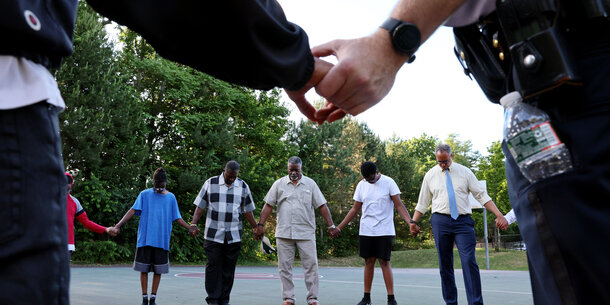Attorney General William Barr has been busy. He’s been making speeches criticizing elected district attorneys who have been pursuing reforms to reduce prison populations. Following the wishes of their voters, they’re instituting policies like more lenient sentences and diversion to drug treatment programs. But Barr wasn’t too busy to have his Justice Department advocate for a lighter sentence for Trump campaign adviser and friend Roger Stone, who was convicted in November of seven federal crimes including lying to Congress, obstruction of justice, and witness tampering.
Barr’s interference in the case — over the objections of career DOJ prosecutors, who quit the case in protest — apparently came at the behest of President Trump. It’s a grave abuse of power that undermines the rule of law and erodes public faith in our criminal justice system. Although the Justice Department is part of the executive branch, it is meant to be independent, not a political tool of the president. Barr’s protestations Thursday about the president commenting about on prosecutions seems disingenuous given the number of times Trump has done so while in office.
Last week, the Justice Department recommended to the court a sentence of seven to nine years in prison, which is in line with department guidelines. But on Tuesday, newly installed DOJ attorneys on the case said the sentence should be shorter. The government’s reversal flies in the face of Justice Department policy, which directs prosecutors to recommend a sentence within the advisory guidelines range in order to achieve “just and consistent results in federal cases.” In other words, to quote the motto etched in stone on the Supreme Court building, “Equal Justice Under Law.”
These extraordinary developments also highlight the attorney general’s retrograde positions on the justice system in general. The same day that his department asked for special treatment for Trump’s friend, Barr gave a speech criticizing prosecutors who are committed to moving away from past incarceration-driven practices. At a law enforcement conference, Barr said, “These self-styled ‘social justice’ reformers are refusing to enforce entire categories of law, including law against resisting police officers. In so doing, these DAs are putting everyone in danger.”
Barr went on to claim that their policies are creating more dangerous cities, namechecking San Francisco, Seattle, St. Louis, Chicago, and Baltimore.
In fact, San Francisco’s 2019 homicide rate was the lowest it has been in 60 years. And in Chicago, where Kim Foxx was elected as state’s attorney, the number of shooting incidents decreased 22 percent during her first year and 14 percent in her second. King County Prosecuting Attorney Dan Satterberg’s first year in office was 2008, and since then, Seattle’s homicide rate has consistently been among the lowest in the nation for major cities.
This is not the first time Barr has criticized local prosecutors for exercising their discretion in choosing not to prosecute certain low-level crimes. Last August, Barr delivered a speech to a police group in New Orleans that was reminiscent of “tough on crime” policies of the 1980s and 1990s. He labeled reform-minded prosecutors — who are relying on decades of evidence that overincarceration does not create healthier and safer communities — as “anti-law enforcement.”
A growing body of research shows that there is little or no relationship between length of incarceration and public safety. A Justice Department report found that recidivism rates did not differ significantly among those released after serving 6 months or less all the way through serving 30 months behind bars.
This new wave of reformist prosecutors is focused on ending the criminalization of poverty by reducing the harmful impact of court-imposed fines and fees and eliminating cash bail. More prosecutors are relying on evidence-based research to prioritize diversion programs to ensure that those with mental health or substance abuse problems are treated instead of spending time locked up.
On Thursday, 39 of those elected prosecutors pushed back on Barr’s misleading attacks, calling him out for trying to go back to a time when “success was measured by how harsh the punishment was, and a fear-driven narrative prevailed.”
Barr is out of step with his own party, as many recent criminal justice reforms have been a bipartisan effort. He’s also out of step with the American public, 71 percent of which support reducing the prison population.
Our prison population — the world’s largest — is mainly drawn from the most disadvantaged groups in the country. Mass incarceration drives and reinforces deep seated racial inequity and disproportionately punishes African Americans. It ruins people’s lives and breaks up families. That’s why the attorney general’s statements are dangerous. We must fight for a justice system that is fair and just for all Americans, not just those in proximity to wealth and power.



